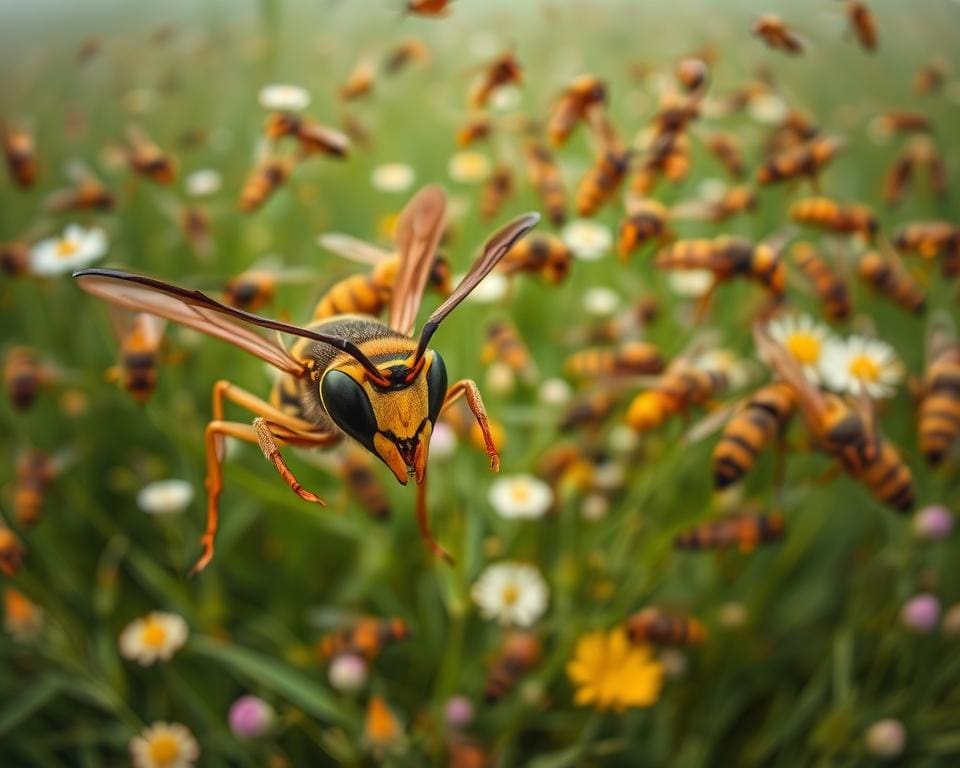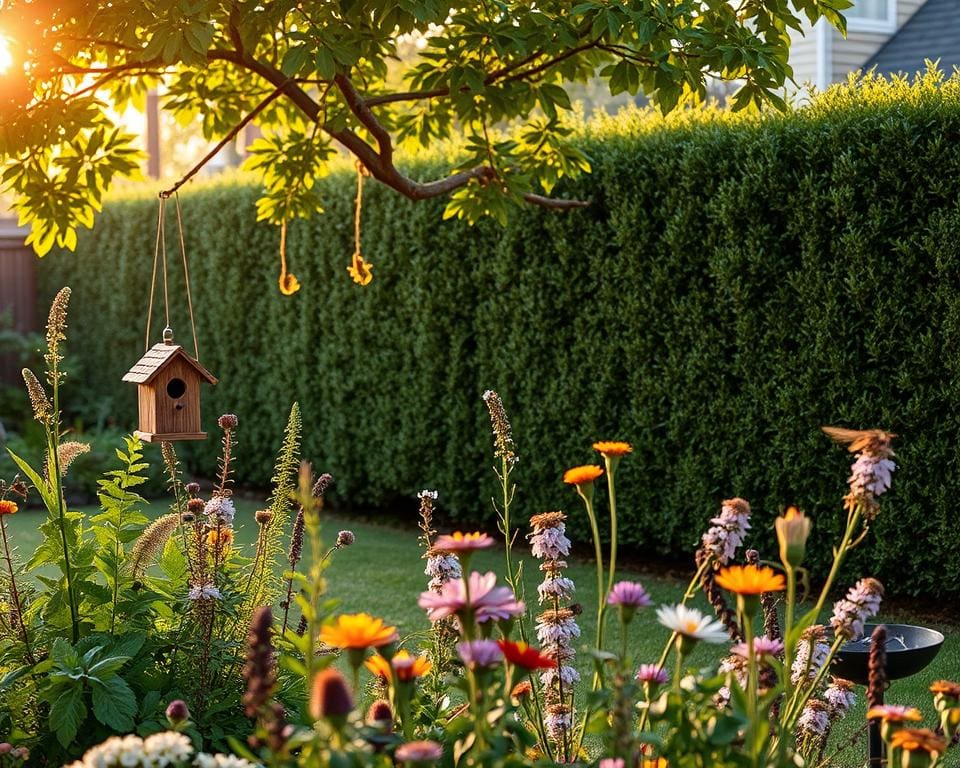Understanding what keeps wasps away from your house is essential for creating a serene outdoor environment. Wasps can pose potential hazards, with their stings leading to painful experiences and, in some cases, allergic reactions. Effective wasp prevention begins with recognising the behaviours and attractants that draw these insects closer to our homes.
By implementing strategic methods for preventing wasps, homeowners can protect their spaces from unwanted visitors. Exploring various repellents and understanding the significance of maintaining a wasp-free zone can lead to a more comfortable and enjoyable living experience. This guide aims to provide you with comprehensive insights and actionable strategies to ensure that your property remains a sanctuary, free from the disturbances caused by wasps.
Understanding Wasps and Their Behaviour
Gaining insight into wasps is vital for managing their presence effectively. Understanding wasps involves recognising their behaviours and life cycles, particularly for homeowners. Knowledge of common species of wasps in the UK enhances this understanding, allowing individuals to identify potential threats. The European wasp and the common wasp are among those frequently encountered, each exhibiting unique behaviours and habitat preferences.
Common Species of Wasps in the UK
In the UK, several species of wasps are prevalent. The most notable include:
- European Wasp – Known for its distinctive yellow and black banding, this species is highly aggressive, particularly during late summer.
- Common Wasp – Similar to the European wasp, it shares many behavioural traits but tends to be less aggressive.
- Solitary Wasps – Unlike social wasps, these operate individually, often preying on pests.
The Life Cycle of Wasps
The wasp life cycle consists of four stages: egg, larva, pupa, and adult. Initially, a queen lays eggs in a nest, which subsequently hatch into larvae. As the larvae develop, they transform into pupae, eventually emerging as adult wasps. Understanding this cycle is crucial for anticipating when wasps may become more active, particularly during warmer months.

What Keeps Wasps Away From Your House
Understanding the factors that attract wasps can play a crucial role in keeping them at bay. These insects are often drawn to readily available food sources, especially sugary substances, which can be prevalent in gardens and patios. Identifying these attractants and taking necessary steps towards their elimination will significantly aid in preventing wasps from home.
Factors That Attract Wasps
Several elements can lure wasps into residential areas. Commonly, they seek out food items such as:
- Sweet fruits and juices
- Open beverage containers
- Food residues left on outdoor furniture
- Pet food left unattended
It is essential to be vigilant about these factors. Keeping outdoor spaces clean can greatly reduce the chances of an unwelcome visit from these pests.
Setting Up a Wasp-Free Zone
Setting up a wasp-free zone involves simple yet effective strategies that can help create an inviting atmosphere for homeowners while deterring wasps. Consider the following tips:
- Store food and beverages properly, ensuring everything is tightly sealed.
- Regularly dispose of rubbish and use bins with tightly fitting lids.
- Avoid leaving food out during outdoor gatherings.
- Monitor areas around entry points for wasp activity.
Implementing these strategies not only helps in creating a protective barrier but also fosters a pleasant environment devoid of unwanted visitors.
Natural Repellents for Wasps
When seeking to keep wasps at bay, natural repellents can offer an effective solution while being gentle on the environment. Embracing the power of essential oils that deter wasps can significantly reduce the presence of these pests in your outdoor spaces.
Essential Oils That Deter Wasps
Several essential oils have proven effective in repelling wasps. Oils such as peppermint, citronella, and eucalyptus stand out for their potent scents. These oils work by masking the fragrances that attract wasps, creating an unfavourable environment for them.
To use these oils, consider the following approaches:
- Peppermint Oil: Dilute 10-15 drops of peppermint oil with water in a spray bottle. Spritz this mixture around areas where wasps frequent.
- Citronella Oil: Combine 10 drops of citronella oil with 250 ml of water. Spray around outdoor living areas to discourage wasps.
- Eucalyptus Oil: Mix eucalyptus oil in a similar fashion, using 10 drops in a spray bottle with water. Apply to the garden and patio spaces.
Homemade Wasp Spray Recipes
Creating homemade wasp sprays allows homeowners to utilise natural ingredients that are effective and safe. Here are two simple recipes:
- Soap and Water Spray: Combine 2 tablespoons of dish soap with 500 ml of water in a spray bottle. This mixture can suffocate wasps on contact.
- Vinegar and Sugar Trap: Mix equal parts of vinegar and sugar water. Place this in a jar with small holes to attract and trap wasps effectively.
Plants That Repel Wasps
Creating a wasp-free environment doesn’t have to involve harsh chemicals. Incorporating plants that repel wasps into your outdoor space serves as one of the most effective natural wasp deterrents. Certain herbs and flowers not only beautify gardens but also emit scents that keep these pests at bay.
Mints, such as spearmint and peppermint, are particularly effective. Their strong aroma acts as a natural barrier against wasps. Rosemary, with its aromatic foliage, serves a similar purpose, making it an excellent choice for landscaping for wasp control. Marigolds, known for their bright colours, also produce a scent that is unappealing to wasps, adding a splash of vibrancy while providing the added benefit of repelling these intruders.
Consider placing these plants strategically around patios, doorways, and other entry points. By creating fragrant focal points in your garden, you enhance the aesthetic appeal while proactively managing wasp populations. Embracing nature to deter pests fosters an inviting atmosphere in your outdoor space.
DIY Wasp Prevention Techniques
Engaging in DIY wasp prevention can significantly enhance your comfort at home. By implementing a few straightforward techniques, you can create an environment that deters wasps from invading your space. Central to these methods are creating physical barriers and managing food sources effectively.
Creating Physical Barriers
One effective way to repel wasps involves creating physical barriers around your home. Consider these options:
- Install screens over windows and doors to block entry points.
- Seal any holes or cracks in walls, particularly around eaves and foundations.
- Utilise traps that attract and capture wasps, keeping them away from your vicinity.
Keeping Food and Waste Sealed
An essential part of DIY wasp prevention focuses on proper food management. Ensuring food is kept sealed can significantly reduce wasp attraction. Here are some tips:
- Always cover outdoor food during gatherings to limit accessibility.
- Promptly clear away leftovers and dispose of waste properly in sealed bins.
- Store fruit and sugary items in airtight containers to minimise odours attracting wasps.
Nest Removal Strategies
Understanding how to address wasp infestations begins with effective nest removal strategies. Proper identification of locations and structures is essential for successful action. Identifying wasp nests takes a keen eye for detail, as these nests can often be found in various areas like attics, eaves, and hidden corners of gardens.
Identifying Wasp Nests
Recognising wasp nests involves looking for specific characteristics that differentiate them from other structures. Here are some key points to assist in identifying nests:
- The nest is usually made of a papery material created from chewed wood and saliva.
- They often appear grey or brown and may be shaped like an inverted teardrop.
- Active nests are home to numerous wasps buzzing around, usually visible during the warmer months.
- Common locations include under the eaves, in lofts, or within shrubs and trees.
Being aware of these traits can aid significantly in pinpointing where these pests reside.
Professional Nest Removal Services
While DIY methods may seem appealing, the risks associated with attempted nest removal cannot be overlooked. Wasps can become aggressive when defending their home, leading to potential stings and allergic reactions. Seeking professional nest removal ensures not only effective elimination of these pests but also prioritises the safety of everyone in the vicinity. Here are advantages of opting for professional services:
- Experts have the experience and knowledge in safely removing nests.
- They often use specialised equipment to minimise risks.
- Professionals can provide advice on preventing future infestations.
Choosing professional nest removal simplifies the process, guaranteeing peace of mind and the elimination of potential dangers associated with wasp nests.
Tips to Deter Wasps from Your Property
Effective wasp prevention requires a proactive approach throughout different seasons. Implementing practical tips to deter wasps helps maintain a harmonious outdoor environment, particularly as warmer months arrive. Emphasising seasonal prevention alongside regular outdoor maintenance can significantly reduce wasp activity around your home.
Seasonal Preventive Measures
During the transition to spring and summer, several steps can support your efforts in wasp deterrence. Focus on:
- Clearing away food residues from outdoor dining areas promptly after gatherings.
- Sealing up any potential nesting sites, particularly hollows in wood and dense vegetation.
- Monitoring and disposing of overripe or fallen fruit from trees.
- Using decoys or traps specifically designed to lure wasps away from your property.
Regular Maintenance of Outdoor Spaces
Ongoing upkeep of your garden and outdoor areas is vital in keeping wasps at bay. Consider these outdoor maintenance strategies:
- Regularly trim hedges and bushes to eliminate sheltered spaces where wasps might build nests.
- Paint over any wood that may be rotting or deteriorating, as it can attract wood-nesting species.
- Maintain cleanliness in barbeque areas by covering grills and removing leftover food items.
- Consistently check for and manage any existing nests before they become a larger issue.
Wasp-Proofing Your Home
Wasp-proofing your home requires a multifaceted approach that combines immediate actions with long-term prevention strategies. By understanding the various factors that attract wasps and implementing effective deterrents, you can create a robust defence against these pests. Start by sealing entry points, maintaining cleanliness in outdoor areas, and employing natural repellents to set the foundation for a wasp-free environment.
Incorporating immediate tactics such as food management and nest identification will help in keeping wasps away in the short term. However, for lasting success, it’s essential to maintain these practices continuously. Regular inspection of potential nesting sites along with seasonal preventive measures ensures that you remain vigilant against re-infestation, promoting a sustainable home environment.
Ultimately, wasp-proofing your home is an ongoing commitment that will yield the best results when approached holistically. By consistently applying these strategies and emphasising cleanliness and prevention, you can enjoy your outdoor spaces without the threat of unwanted visitors. Make it a priority to blend short-term actions with effective long-term prevention for a truly wasp-free experience.









